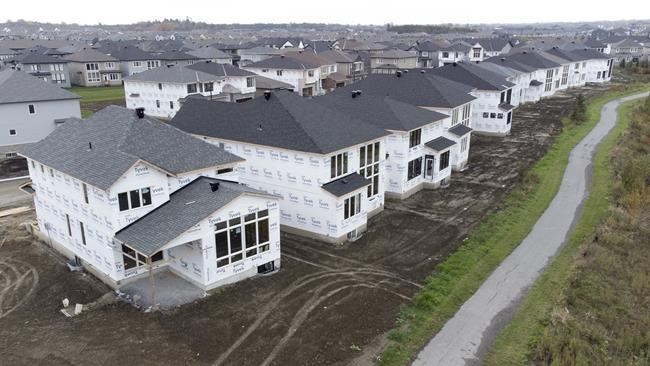TORONTO — From ultra-low interest rates that led to a huge spike in real estate demand to the speed with which interest rates shot up to levels not seen in a generation, it’s been hard to keep up with the shifting landscape for mortgage holders.
Now, with interest rates increasingly expected to stay higher for longer, many of the homeowners who locked in low rates years ago are likely bracing themselves for financial pain as their mortgage comes up for renewal.
“Each month that passes, roughly two per cent of mortgage holders face renewal at sharply higher interest rates,” Royce Mendes, managing director and head of macro strategy at Desjardins, wrote in a Sept. 19 note to clients.
Borrowers with fixed rates are expected to see an average payment increase of between 14 per cent and 25 per cent next year compared with early 2022 costs, according to the Bank of Canada. In 2025 and 2026, payments should rise between 20 per cent to 25 per cent.
Those with full variable rates have already taken on the burden of higher rates, seeing their payments rise an average of 49 per cent as of this year.
Borrowers with variable rates but fixed monthly payments will face the greatest increases ahead as some have had their payments only cover the interest costs, or not even that. People with these products face an expected 44 per cent average rise in payments by 2026 as their mortgages reset.
Peter Routledge, head of Canada’s banking regulator, warned in September that this category of borrowers, which total about $369 billion of the $2.1 trillion of outstanding mortgage market, are “at risk of suffering a significant payment shock," and that he hopes to see the option offered less.
Given the steep rises in payments, banks and other lenders have been responding in part by stretching out amortizations to reduce monthly payments.
More than 46 per cent of Canadian mortgages had payment schedules longer than 25 years as of the second quarter, according to the Bank of Canada, an amount that’s been steadily rising from around 32 per cent in the summer of 2020.
Many mortgage amortizations at Canada’s biggest banks now stretch past 30 years, from 24 per cent of mortgages at RBC to 30 per cent at BMO, with the vast majority going beyond 35 years. CIBC and TD Bank fall somewhere in between those two, while Scotiabank is notable for only having one per cent of mortgages run past 30 years.
The banking regulator has also been raising concerns about these extended mortgage terms, which slow how quickly people build equity in their home. Lenders in turn have also been looking to reduce lengthy mortgages, with most reporting last quarter that they had knocked a percentage point or two off their total of 30-year plus mortgages.
As extended amortizations fall out of favour, borrowers may have to come up with a lump sum or increase their monthly payments to bring their loans back in line, which the regulator suggests as the preferred options.
Coming up with the funds could prove challenging for many though, as cracks start to show in credit markets.
“Your auto loans, your credit cards, lines of credit, delinquencies in those products are going up," said Seamus Benwell, a housing research specialist at Canada Mortgage and Housing Corp.
Borrowers that aren’t able to handle higher payments or don’t have the cash on hand for a lump sum will have to look at all of their options, according to Meaghan Hastings, chief executive of The Mortgage Coach brokerage.
She said she's heard from clients who are surprised to learn just how high interest rates have climbed, especially since they have to pass the mortgage stress test if they want to switch lenders.
The test is pushing more borrowers into the alternative lending market, she said.
“They have great credit, they have great income. But it's that qualification that pushes them into the alternative space.”
While alternative products generally cost more, there are a growing number of options in the space, said Hastings.
“Sometimes there's solutions that will just get them through the next 18 to 24 months, you know, through the hardest area or the hardest time.”
Hastings said she does expect some housing investors to offload some condos because of the financial strain, but that overall, most homeowners will do what it takes to hold on to their property, whether it’s selling their car, taking a job or whatever else they can figure out.
“Canadians in general will do really anything possible to keep their home. We love being homeowners.”
This report by The Canadian Press was first published Oct. 2, 2023.
Ian Bickis, The Canadian Press



